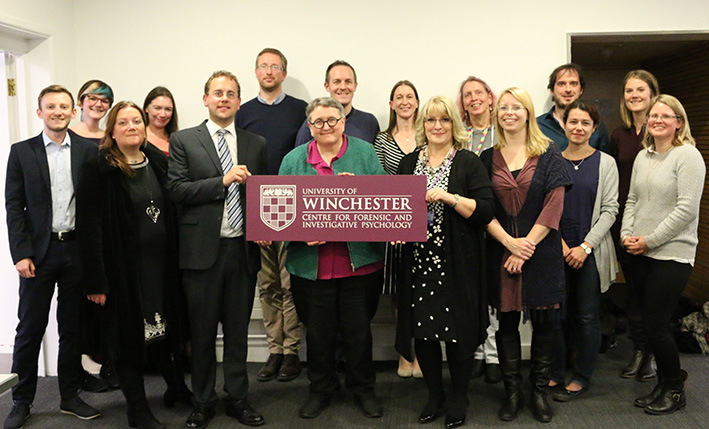
From the launch of the University's new research hub for forensic and investigative psychology to Winchester University Press' new Open Access e-platform and evidence to a House of Lords Select Committee from an information rights expert, here's a roundup of our latest research news.
University launches new Centre for Forensic and Investigative Psychology

October saw the formal launch of the University's new research hub, the Centre for Forensic and Investigative Psychology. Headed by Director Dr Wendy Kneller, senior lecturer in Psychology, the Centre brings together a wide variety of academic expertise in forensic practice in the legal and criminal justice system, including eyewitness identification, interviewing witnesses and detecting deception in interviews.
The Centre has been set up to encourage and develop research opportunities and to disseminate research both within the University and externally. It will also support postgraduate students and run a programme of regular research seminars. The next seminar with speaker Professor Aldert Vrij of the University of Portsmouth on 22 November deals with verbal lie detection.
The launch event saw a lecture by leading forensic psychologist Becky Milne, Professor of Forensic Psychology at the University of Portsmouth. Let Them be Heard: Enabling Communication and Recall of Forensic Interviewees focused on work by researchers to develop procedures that improve the quality of investigative interviews with witnesses, victims and suspects of crime.
Information rights expert publishes evidence to Lords Select Committee on Artificial Intelligence

Marion Oswald, Senior Fellow in Law and Head of the Centre for Information Rights at the University, submitted written evidence to the Lords Select Committee on Artificial Intelligence which was established to examine the economic, ethical and social implications of advances in AI.
Written with Sheena Urwin, Head of Criminal Justice at Durham Constabulary, the paper reflects on the Constabulary's experience of using algorithms to help decide whether to charge a suspect or offer alternative courses of action. It also includes parts of their research into safeguards required for the responsible use of algorithmic tools within policing.
In their paper, they comment on issues such as the ethical implications of the development and use of AI, what the government's role should be and how the general public can best be prepared for more widespread use of AI. On the latter point, the authors argue:
"From the beginning of the development of this tool, and since its validation, Durham Constabulary has been open about its use .... ,the tool's internal workings and the results of the first validation exercise, attracting considerable attention (and sometimes criticism). The purpose of being so open was to acknowledge that this approach is new to policing and is therefore also new to communities. Secondly, being open permits learning and understanding from others in relation to concerns and issues that exist. Thirdly and lastly, capturing that learning throughout the exploratory process has allowed the Constabulary to use these lessons to help develop a framework to support and assist other police organisations." Read the evidence here.
New book demystifies essence of creative thinking
"In the past, it was enough for young people to know and do things. Today, they need more than subject knowledge in order to thrive: they need capabilities. A key capability is creative thinking and all children need to learn how to develop ideas, collaborate and think critically," commented Professor Bill Lucas, Director of the Centre for Real-World Learning at the University, at the launch of his acclaimed new book.
Written with Dr Ellen Spencer, Senior Researcher at the Centre, Teaching Creative Thinking: Developing Learners (2017, Crown House) is aimed at helping schools develop creative thinking in learners.
The much-heralded new book has been very well received, with Dame Alison Peacock, Chief Executive, Chartered College of Teaching, saying: "A hugely welcome book, full of practical examples of pedagogy to cultivate knowledge, skills and capabilities, all the while recognising the power of professional learning communities within and between schools." Find out more
The launch of the book follows the announcement of Professor Lucas's appointment as co-chair of a new global test of Creative Thinking to be developed by PISA (Programme for International Student Assessment) in 2021 to supplement their testing of 15-year-olds' core capabilities in English, maths and science.
Winchester University Press launches Open Access e-platform
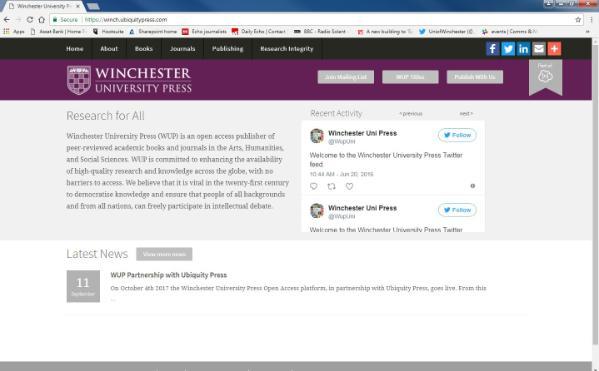
In an exciting new development in its history, Winchester University Press (WUP) has launched an Open Access e-platform, allowing audiences across the world to access high-quality academic research.
As a member of the Ubiquity Partnership Network, WUP now has working relationships with the other institutions involved, which include the Finnish Literature Society; Open Communications Press; the Open Library of the Humanities; the Open University of Catalonia; Penn State University Press; Stockholm University Press; University of Westminster Press; University of Utrecht Open Access Journals; White Rose University Press (Leeds, Sheffield, York); and the University of California Press.
The commitment to Open Access will boost WUP's identity as an academic publisher and help to make it a more significant feature of the global academic publishing landscape. It will also enhance the University's reputation as a producer and a disseminator of high-quality research and knowledge. Visit the new WUP website.
Winchester historians share expertise at BBC History Weekend
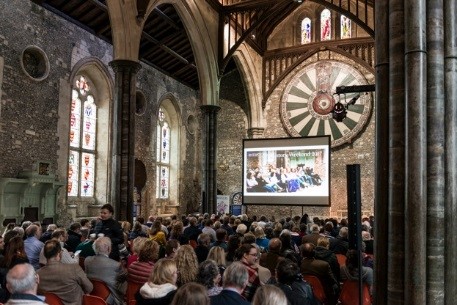
(Photo by Steve Sayer, the Secret Studio, courtesy of History Extra)
Intriguing talks about the lives and roles of medieval British royalty by University historians formed part of the rich historical expertise on offer at the BBC History Weekend in Winchester in early October. Dr Ellie Woodacre, Dr Carey Fleiner, Dr Ryan Lavelle and Dr James Ross all spoke about their research, with Ryan and Ellie also offering historical walking tours around the city.
The University's fringe event at the weekend history festival, History Bites, featured eight short talks from postgraduate students and staff, including insights into the spending habits of Henry VII and VIII and a study of four fifteenth century royal women who were accused of witchcraft. Find out more.
The word on the street: University lecturer writes fiction series for reluctant readers
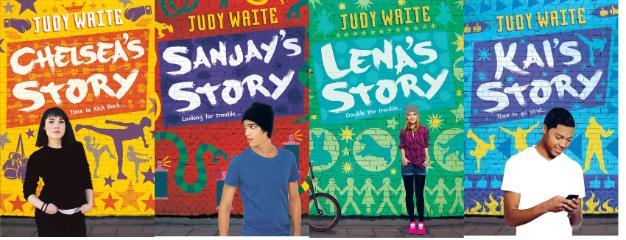
Judy Waite, University Creative Writing lecturer and author of children's and Young Adult fiction titles, has just published four linked novellas pitched at struggling readers.
These readers have a range of blocks around reading, including English not being their first language, being diagnosed as dyslexic or with other learning needs or just being 'turned off' from reading.
Judy created four characters with diverse backgrounds living on the same street, then plotted contemporary storylines to connect with the target readers. She worked with literacy specialists and in particular trainers from Catch-up, who run literacy intervention schemes across the UK.
At 5,000 words each, the stories are very short but they evolved through a wealth of research and rewriting.
The Street: Kai's Story, Chelsea's Story; Sanjay's Story; Lena's Story are published by Bloomsbury Education London.
Highlighting the role of translations and translators
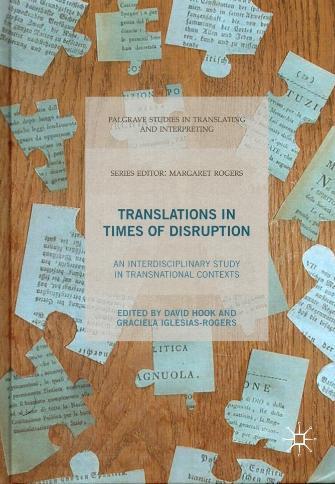
A new book, co-edited by University of Winchester academic Dr Graciela Iglesias Rogers, throws light on the relevance and role played by translations and translators at times of serious discontinuity throughout history.
Translations in Times of Disruption: an Interdisciplinary Study in Transnational Contexts (Palgrave Macmillan, 2017), written with Professor David Hook of the University of Oxford, contains two chapters by Dr Iglesias Rogers, a senior lecturer in Modern European and Global Hispanic History, including one tracing the origin of the inaccurate use of the terms 'empire' and 'colonies' in relation to the global Hispanic world.
Topics explored by scholars from different continents and disciplines include war, the disintegration of transnational polities, health disasters and revolutions - be they political, social, cultural and/or technological. Find out more.
University backs pledge to support research technicians
The University has signed the Technician Commitment, a sector-wide initiative led by the Science Council and supported by the Gatsby Foundation to address key challenges facing technical staff working in research.
Five target areas have been identified, which universities and institutions will work to improve to safeguard vital technical skills. The commitment will ensure greater visibility, recognition, career development and sustainability for technicians across all disciplines.
Winchester joins 60 other universities and research institutions from across the UK who have also signed the Commitment, representing nearly 50 per cent of UK universities.
Back to media centre